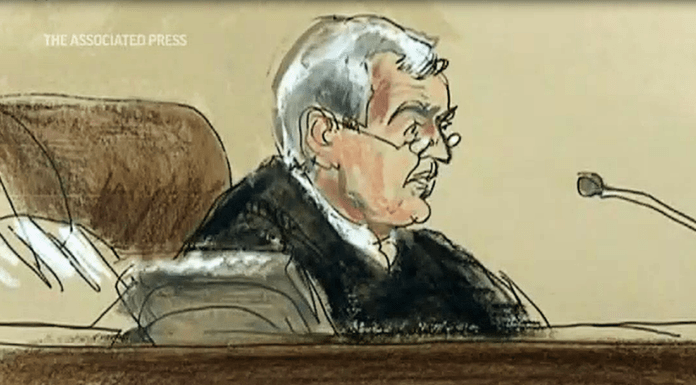(Headline USA) A federal judge on Thursday appointed a veteran New York jurist to serve as an independent arbiter in the criminal investigation into the presence of classified documents at former President Donald Trump’s Florida home.
U.S. District Judge Aileen Cannon empowered the newly named special master, Raymond Dearie, to review the entire tranche of records taken in the Aug. 8 search of Mar-a-Lago and set a November deadline for his work. In the meantime, she continued to block the department from using for its investigation roughly 100 documents marked as classified that were seized.
The sharply worded order from Cannon, a Trump appointee, will almost certainly slow the pace of the politically charged investigation and set the stage for a challenge to a federal appeals court.
Trump and supporters have routinely accused the Merrick Garland-run Justice Department of targeting their political rivals, with Trump being chief among them. It is just the latest in a litany of FBI and DOJ hoaxes that began with the Russia-collusion operation even before Trump took office.
More recently, the DOJ has attempted to label all Trump supporters as domestic terrorist and has used its claims as the basis to conduct potentially illegal domestic surveillance and searches on dozens of Trump supporters and allies.
The Aug. 8 raid of Mar-a-Lago—with the FBI claiming Trump had illegally purloined top secret classified documents and the former president arguing he had the authority to declassify them under the Presidential Records Act—drew widespread calls for the nation’s top federal law-enforcement agency to be defunded and decentralized.
The department had given Cannon until Thursday to put on hold her order pausing investigators’ review of classified records while the special master completes his work. The department said it would ask the Atlanta-based 11th U.S. Circuit Court of Appeals to intervene if she did not do so by then.
The Justice Department did not immediately comment on Thursday’s ruling.
Cannon, who last week granted the Trump team’s request for a special master over the objections of the Justice Department, made clear in her Thursday order that she was not prepared to blindly accept the government’s characterizations of the documents, saying “evenhanded procedure does not demand unquestioning trust in the determinations of the Department of Justice.”
She turned aside the department’s position that Trump could not have any ownership interests in the documents, and said she was receptive to the possibility that the former president could raise valid claims of privilege over at least some of the records.
She noted ongoing disagreements between the two sides about the “proper designation of the seized materials” and the “legal implications flowing from those designations.”
“The Court does not find it appropriate to accept the Government’s conclusions on these important and disputed issues without further review by a neutral third party in an expedited and orderly fashion,” she wrote.
The selection of Dearie, a former federal prosecutor who for years served as the chief judge of the federal court based in Brooklyn, came after both the Justice Department and Trump’s lawyers made clear they would be satisfied with his appointment as a so-called special master.
However, it raised some eyebrows given Dearie’s past role in approving the FBI’s fraudulent wiretap warrent requests for Trump adviser Carter Page as one of the four judges with the Foreign Intelligence Surveillance Court to approve the spying.
It is unclear whether the bureau’s past deception may have made Dearie—a Ronald Reagan appointee—more skeptical of the intelligence community’s overall honesty and integrity.
As special master, Dearie will be responsible for reviewing the entire inventory of documents taken during the search of Mar-a-Lago—the FBI says it recovered about 11,000 documents from the home during its search, including roughly 100 with classification markings—and segregating out any that may be covered by claims of executive privilege or attorney–client privilege.
He is also tasked with identifying any personal materials of Trump’s that should possibly be returned to him.
The Justice Department said last week that it did not believe that the special master should inspect records with classified markings or evaluate the former president’s assertions of privilege.
Cannon rejected both positions Thursday, directing the special master to prioritize in his review the documents marked as classified, “and thereafter consider prompt adjustments to the Court’s Orders as necessary.”
She set a deadline of Nov. 30 for the special master to complete the work.
Cannon rejected that idea Thursday, that its investigation would be harmed if the judge did not quickly lift her block.
“[T]here has been no actual suggestion by the Government of any identifiable emergency or imminent disclosure of classified information arising from Plaintiff’s allegedly unlawful retention of the seized property,” she noted.
She added, “Instead, and unfortunately, the unwarranted disclosures that float in the background have been leaks to the media after the underlying seizure.”
She also said nothing in her order barred the department from “conducting investigations or bringing charges based on anything other than the actual content of the seized materials,” saying investigators were welcome to interview witnesses and collect information about the “movement and storage of seized materials.”
Dearie served as the top federal prosecutor for the Eastern District of New York from 1982 to 1986, at which point he was appointed to the federal bench by then-President Reagan.
Dearie was chief judge of the district from 2007 to 2011, when he took senior status. But the Justice Department has said he remains active and had indicated to officials that he was available for the position and could work expeditiously if appointed to it.
Adapted from reporting by the Associated Press

